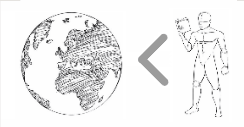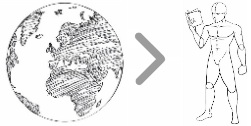An environmental value system (EVS) is a particular worldview or set of paradigms that shapes the way individuals or societies perceive and evaluate environmental issues. This view is influenced by cultural (including religious), economic and socio-political contexts (for example whether individuals are from a less economically developed country (LEDC) or a more economically developed country (MEDC), a democratic or authoritarian society).
An EVS, like all other systems, has inputs (such as education, media and religious doctrines) and outputs (such as perspectives, actions and ) which are determined by processing (learning, decision making, rejecting) of the inputs. Information flows to individuals in societies are processed into changes in perceptions of the environment and changes in decisions about how to react to environmental issues. Some inputs will have no obvious immediate effect on an individual or group while others will lead to direct actions in response to concerns about the environment. Information comes from ideas in film, books and newspapers and so on and some people link those who originate this information to the ‘producers’ in an ecosystem. Other members of society then become the ‘consumers’ of the new ideas.
The class notes can be found here: T1 Environmental Value Systems
TASK: Complete the systems values survey ticking the scale regarding the extent to which you agree or disagree with the statements listed. Once done, follow up with the discussion questions with a partner. [We will come back to further analyse these so keep the handouts handy.]
TASK: Autobiography: My relationship with Earth. Guiding notes here:
Environmental Philosophies Continuum and Worldviews
Technocentrism proposes that humans and technology will always be able to provide a solution to difficulties whether they are scientific or political. In ecological systems, technocentrics believe that te chnology will always be able to solve environmental problems, even when humans push resources to the limit. At one extreme of the range, some technocentrics, known as the Cornucopians, view the world as a place with infinite resources to benefit humans. They believe that growth will provide wealth to improve the lives
chnology will always be able to solve environmental problems, even when humans push resources to the limit. At one extreme of the range, some technocentrics, known as the Cornucopians, view the world as a place with infinite resources to benefit humans. They believe that growth will provide wealth to improve the lives  of everyone. They propose that a free-market economy can achieve this. At the other extreme, another group – the environmental managers – see the world in terms analogous to a garden which needs care and attention or ‘stewardship’. They hold that legislation is needed to protect the environment and that if an environment is damaged, those who suffer should receive compensation. They believe that if humans take care of the Earth, it will take care of them.
of everyone. They propose that a free-market economy can achieve this. At the other extreme, another group – the environmental managers – see the world in terms analogous to a garden which needs care and attention or ‘stewardship’. They hold that legislation is needed to protect the environment and that if an environment is damaged, those who suffer should receive compensation. They believe that if humans take care of the Earth, it will take care of them.
Ecocentrism takes a nature-centred, holistic view of the world. It proposes that we know very little about living things and their complex relationships so we cannot  have the ability to manage the environment in the way that technocentrics suggest. Biocentric or life-centred philosophers consider that all life is inherently valuable and is not simply for use by humans. They consider that people should not harm any species whether it is useful or not and that we should preserve ecosystems so that life will thrive. Humans are just one species which is no more important than any other. Some ecocentrics stress the holistic nature of our ethical obligation to the Earth, highlighting the need to limit our use of its resources. One group of ecocentrics are the self-reliant soft ecologists who believe small-scale, local and individual actions, such as recycling, can make a difference. At the other end of the spectrum are deep ecologists who value nature over humanity and believe that all species and ecosystems have values and rights that humans should not interfere with. They believe that the human population should decrease so that humans consume less of the Earth’s resources.
have the ability to manage the environment in the way that technocentrics suggest. Biocentric or life-centred philosophers consider that all life is inherently valuable and is not simply for use by humans. They consider that people should not harm any species whether it is useful or not and that we should preserve ecosystems so that life will thrive. Humans are just one species which is no more important than any other. Some ecocentrics stress the holistic nature of our ethical obligation to the Earth, highlighting the need to limit our use of its resources. One group of ecocentrics are the self-reliant soft ecologists who believe small-scale, local and individual actions, such as recycling, can make a difference. At the other end of the spectrum are deep ecologists who value nature over humanity and believe that all species and ecosystems have values and rights that humans should not interfere with. They believe that the human population should decrease so that humans consume less of the Earth’s resources.
Anthropocentrism is the people-centred view of the world that includes viewpoints from both ecocentrism and techocentrism. People living in MEDCs are more likely to have this worldview. Humans are viewed as a dominant species, which manages the environment for its own requirements. Anthropocentrics’ views include some of those of self-reliant soft ecologists and some of environmental managers.
that includes viewpoints from both ecocentrism and techocentrism. People living in MEDCs are more likely to have this worldview. Humans are viewed as a dominant species, which manages the environment for its own requirements. Anthropocentrics’ views include some of those of self-reliant soft ecologists and some of environmental managers.
TASK: Find two contrasting newspaper/internet/magazine articles about any environmental issue. One should represent an Ecocentric worldview of the environment and the other a Technocentric one. Justify your choice in the following way:
- ‘Paste’ each article at the center of a document (or hard copy A3)
- highlight sentences in the article that support the justification you are trying to make
- add bullet comments taken directly from the Environmental Philosophies handout as annotations (call-out comments in bubbles).
- The idea is that you are connecting parts of the articles with the philosophies
The environmental movement
How did the environmental philosophies come to be?
Where do environmentalists come from?
With the autobiography of your relationship with Earth, you searched and dug deep into your own personal history for moments or events that have defined your environmental worldview. In the same way that you have done so, we will look at various influential groups, individuals, organisations and events that have defined the environmental movement through time.
Class Notes and homework task
 The Economist’s special report this week:
The Economist’s special report this week:
Who is this?
Where is he?
What is he doing?
Why is he doing it?
Who is the intended audience?
What does the title suggest?
Environmental Movement Video Timeline:
TASK: Summarise your moment, event, policy, or individual in 3-4 phrases – bullets are fine. Replace the short video (4 min max) if you find a better one. What caused your moment, event, policy or individual to change or influence how the world views the environment? How did it contributed to the Environmental Movement?
1956 – Minamata + Chisso Corporation
1962 – Rachel Carson’s Silent Spring
1970 – Whaling and ‘Save the Whale’
1972 – The Club of Rome’s Limit’s to Growth
(1972) – UN Human Environment (Stockholm Convention)
1979 – James Lovelock’s Gaia
1984 – Union Carbide in Bhopal
1986 – Chernobyl in Ukraine
1987 – Our Common Future/Brundtland Report
1992 – Rio Earth Summit and Agenda 21
